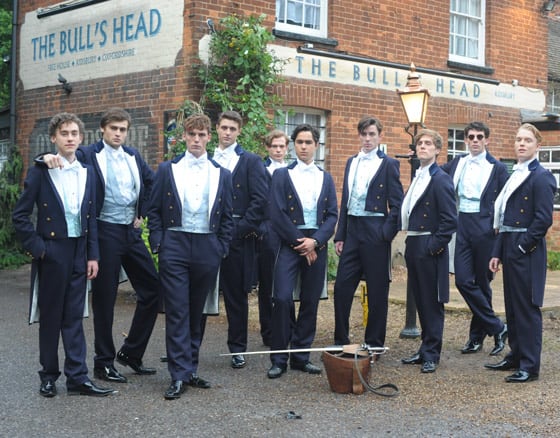Initially, Lone Scherfig's The Riot Club doesn't seem like much. Miles (Max Irons) and Alistair (Sam Clafin), two very different affluent young men navigating new terrain at Oxford — Alistair is a smug dick and Miles is a tad more grounded, proud to date Lauren (Holliday Grainger), a girl of a "lower" class — join a "skulls"-like group of elitist rich kids known as the titular riot club. They enjoy the hedonistic shenanigans at first, mostly involving binge drinking, but are clearly heading down different paths. As a template, the story appears to be a pretty standard take on the coming-of-age decisions that define who we become.
Since Scherfig has tackled this territory before with An Education, it seems plausible that she might examine this stage of life from a male perspective at a cursory glance, but there's a lot more going on here than just the trials and tribulations of friendship and masculine development. The writer, Laura Wade, is a noted and talented playwright. Though Posh, the play on which The Riot Club is based, is a minor thematic departure from her previous works, which frequently examined the nature of mortality and coping, it still has the oversight of a sharp female eye. Similarly, Scherfig, despite having a seemingly disjointed auteur vision, consistently tackles the nature of trust, perception and the dangers of diving into something unknown recklessly with her works. What they have in common is an in-depth understanding of human development and the many socio-cultural and metaphysical factors that go into creating an identity or ideologue. This makes the eventual shift in The Riot Club's narrative that much more pointed and incisive.
Having been booted from most establishments in Oxford, the club, which is composed of an assortment of homely, androgynous, pointy-faced boys, seemingly cast specifically for their smug disposition and lack of masculinity, attend a rural country pub for an annual dinner. While indulging in various liquors and delicacies, alienating the other patrons and treating the waiting staff like shit, they decide to bring in a hooker (Natalie Dormer, who almost steals the show with her small role) to with whom they plan to have group sex. When they're denied — something spoilt rich white boys aren't accustomed to — all hell breaks loose.
Pointing out that male entitlement is a dangerous force that accounts for an abundance of problems in the world is well-worn territory, but it remains absolutely relevant and current, and Wade and Scherfig develop their message perfectly, creating an identifiable circumstance for men to engage with before pulling out the carpet and shifting lighthearted youthful whimsies into horror.
Some of the earlier developments in the film are a tad laboured — the relationship between Miles and Lauren is never particularly interesting — but the outcome and the point of it all do pack an effective punch. It's just a shame that the audience that will appreciate a film like this are those that already understand and appreciate what it's saying. Those being criticized would surely just respond defensively.
(Soda Pictures)Since Scherfig has tackled this territory before with An Education, it seems plausible that she might examine this stage of life from a male perspective at a cursory glance, but there's a lot more going on here than just the trials and tribulations of friendship and masculine development. The writer, Laura Wade, is a noted and talented playwright. Though Posh, the play on which The Riot Club is based, is a minor thematic departure from her previous works, which frequently examined the nature of mortality and coping, it still has the oversight of a sharp female eye. Similarly, Scherfig, despite having a seemingly disjointed auteur vision, consistently tackles the nature of trust, perception and the dangers of diving into something unknown recklessly with her works. What they have in common is an in-depth understanding of human development and the many socio-cultural and metaphysical factors that go into creating an identity or ideologue. This makes the eventual shift in The Riot Club's narrative that much more pointed and incisive.
Having been booted from most establishments in Oxford, the club, which is composed of an assortment of homely, androgynous, pointy-faced boys, seemingly cast specifically for their smug disposition and lack of masculinity, attend a rural country pub for an annual dinner. While indulging in various liquors and delicacies, alienating the other patrons and treating the waiting staff like shit, they decide to bring in a hooker (Natalie Dormer, who almost steals the show with her small role) to with whom they plan to have group sex. When they're denied — something spoilt rich white boys aren't accustomed to — all hell breaks loose.
Pointing out that male entitlement is a dangerous force that accounts for an abundance of problems in the world is well-worn territory, but it remains absolutely relevant and current, and Wade and Scherfig develop their message perfectly, creating an identifiable circumstance for men to engage with before pulling out the carpet and shifting lighthearted youthful whimsies into horror.
Some of the earlier developments in the film are a tad laboured — the relationship between Miles and Lauren is never particularly interesting — but the outcome and the point of it all do pack an effective punch. It's just a shame that the audience that will appreciate a film like this are those that already understand and appreciate what it's saying. Those being criticized would surely just respond defensively.
